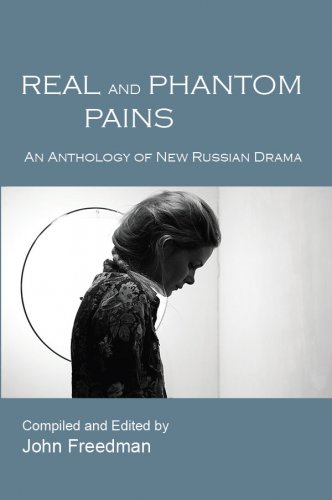
About the Author
JOHN FREEDMAN has translated more than 60 Russian plays, which have been performed on four continents. His play Dancing, Not Dead won the The Internationalists’ new play competition in 2011, and his short play Five Funny Tales from Buenos Aires was performed in New York and Edinburgh in 2013. He has published and/or edited ten books about Russian theater, including Silence’s Roar: The Life and Drama of Nikolai Erdman, and Provoking Theater: Kama Ginkas Directs, co-written with Ginkas. He has been the drama critic of The Moscow Times since 1992, and has written about Russian theater for the New York Times, the Boston Globe, TheatreForum, American Theatre and many other publications. As co-editor of the Russian Theater Archive he oversaw the publication of 21 books about Russian drama. His TheaterPlus blog has been an important source of information on Russian culture, society and politics since 2009.
REAL AND PHANTOM PAINS: An Anthology of New Russian Drama
John Freedman, ed.New Academia Publishing, 2014
506 Pages
ISBN 978-0-9915047-6-3 Paperback
For BULK ORDERS, order directly from New Academia Publishing.
Queries: orders@newacademia.com
About the Author
JOHN FREEDMAN has translated more than 60 Russian plays, which have been performed on four continents. His play Dancing, Not Dead won the The Internationalists’ new play competition in 2011, and his short play Five Funny Tales from Buenos Aires was performed in New York and Edinburgh in 2013. He has published and/or edited ten books about Russian theater, including Silence’s Roar: The Life and Drama of Nikolai Erdman, and Provoking Theater: Kama Ginkas Directs, co-written with Ginkas. He has been the drama critic of The Moscow Times since 1992, and has written about Russian theater for the New York Times, the Boston Globe, TheatreForum, American Theatre and many other publications. As co-editor of the Russian Theater Archive he oversaw the publication of 21 books about Russian drama. His TheaterPlus blog has been an important source of information on Russian culture, society and politics since 2009.
About the book
New drama flourished (almost) exclusively in small spaces, often in dingy basements that employed and accommodated small numbers of people. The big theaters largely turned a blind eye to what was happening on small stages and in backrooms in playhouses, libraries and community centers in a few chosen hot spots around Russia – primarily Moscow, Yekaterinburg and Togliatti. In many cases, they took actively hostile stances toward it. This would change, however. And by the beginning of the century’s second decade, new drama was threatening to become a mainstream phenomenon. Not every theater staged plays associated with new drama, but almost every one began staging plays influenced by the themes, methods and language of the new drama movement.
Many of these translations have achieved traction in the United States. Four of the ten plays were translated and produced or workshopped in conjunction with the Center for International Theatre Development/Towson University Theatre Department Russia project (Frozen in Time, Martial Arts, the two Natasha Plays, I Won and Natasha’s Dream). Flying had its U.S. premiere in January 2011 at the Breaking String Theater in Austin, TX, and was revived in Vancouver, Canada, in Feb. 2013. The translation of Kitchen was workshopped at Wordbridge Playwright Laboratory in June 2010. One Hour Eighteen was produced as a staged reading at Towson University in November 2010, the Kennan Institute in April 2011, at Single Carrot Theater in May 2011. In Feb. 2013 at Breaking String Theater Trash was given a staged reading while Martial Arts was given a full production. The Natasha Plays have been given readings at numerous theaters since 2010.
Praise
“Few people know more about what is happening on the Moscow scene than John Freedman (including few Russians). As Moscow Times theater critic throughout the post-Soviet period John could well have seen more theatrical productions in Russia than anyone else. I can’t imagine anyone who would do a better job.”
―Blair A. Ruble, Director, Program on Global Sustainability & Resilience, Woodrow Wilson Center.
“The relevance of this anthology is not limited to art or the Fine Arts. New Drama has an implicit politics that should be of interest to political scientists, social historians, and cultural anthropologists of the postSoviet period. As Freedman points out here and elsewhere, the plays provide a ‘unique generational perspective’ on Russia after the collapse of communism.”
―Caryl Emerson, Professor of Slavic Languages and Literatures, Princeton University.
“While other existing volumes focus on 18th, 19th, and early 20th century Russian drama, Freedman’s edition would present the unique and important contributions of the new generation of Russian writers portraying the realities and experiences of a post-Soviet generation. John has carefully selected a representative cohort of ten of the most visible, productive, and influential of these writers for the volume.”
―Thomas J. Garza, University Distinguished Teaching Associate Professor, University of Texas at Austin.
“Real and Phantom Pains would be of great utility for American theater directors and departments and faculty and students of Russian literature and culture. The anthology is designed with both sets of reader/users in mind, the more so because Freedman is not only an excellent American-English translator of Russian drama, but also a theater professional, having overseen productions of new Russian dramas in the United States.”
―Beth Holmgren, Professor and Chair, Slavic and Eurasian Studies, Duke University.
“Freedman’s anthology of New Russian drama will be a valuable addition to the marketplace, as so little of Russian drama is produced in the States. The English translations available are often only in British English, with enough strange idioms for American ears that make them less desirable to American theater producers. Having a collection of excellent New Russian drama available will be welcomed amongst the American theatrical community.”
―Preston Whiteway, Executive Director, The Eugene O’Neill Theater Center.





 Coming Soon
Coming Soon Awards
Awards